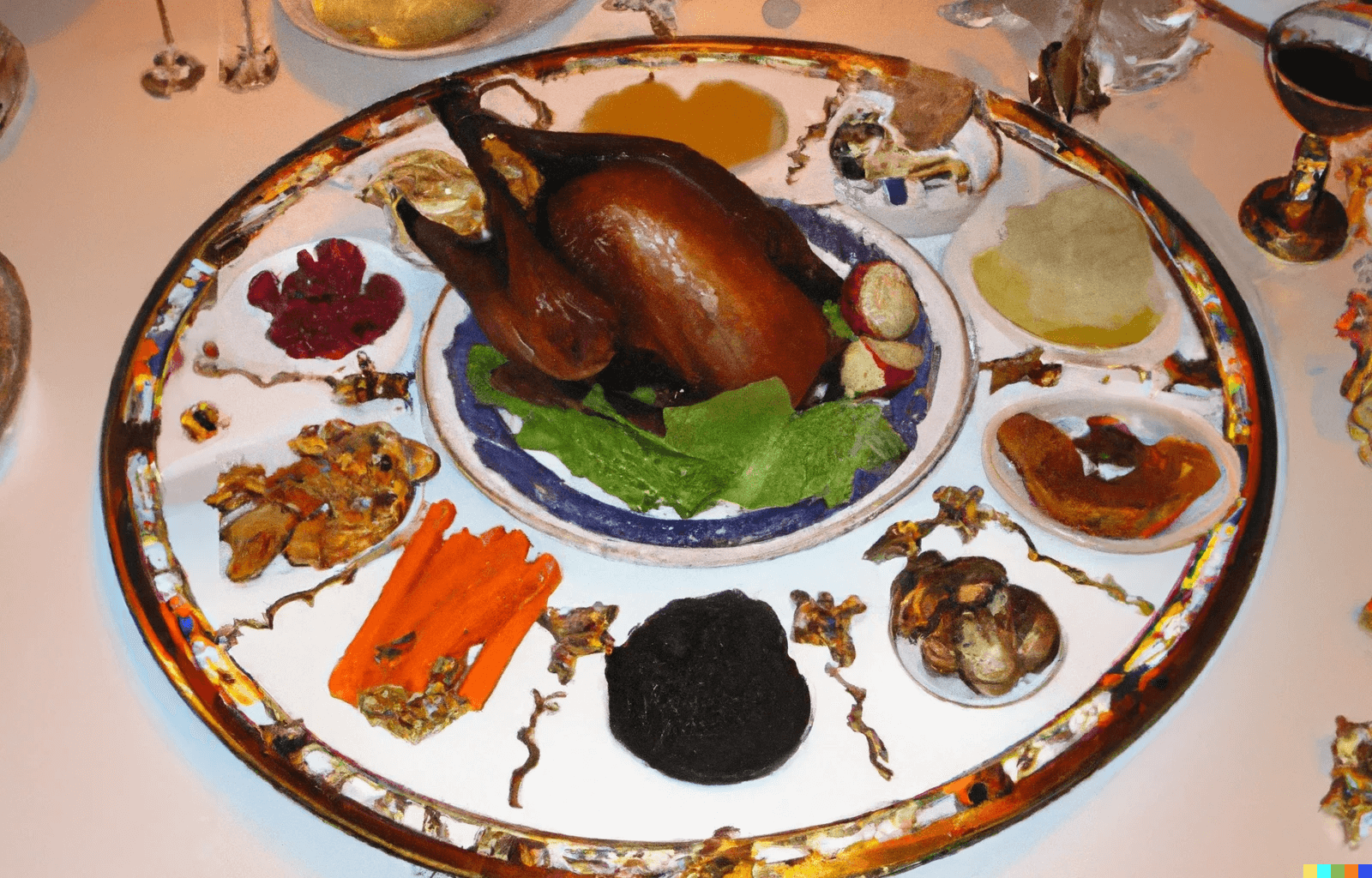Worried about war talk at your Thanksgiving table? Here’s 4 questions to start with
The Passover Seder has a lot to offer as we struggle to connect across generations

An AI-generated image of a Passover Seder plate with a Turkey. Image by Samuel Breslow via DALLE-2
For all the joys of Thanksgiving, it is a holiday that can bring the pent-up pressures of family dynamics into full relief. All our intergenerational fissures around a single table for an exclusive one-night engagement.
This year, the Israel-Hamas war may make many Thanksgiving dinner conversations more challenging than usual. Even among those who stand united in support of Israel’s right to defend itself, the need to free the hostages, and to free innocent Palestinians from the terrorist grip of Hamas, in many homes these shared values come alongside tense questions pointed in both directions.
At what price to Palestinian civilian life is Israel’s war against Hamas justified? Why have many in the world found it difficult to name the evil of Oct. 7? Is all anti-Zionism anti-Semitism? What is the line between free speech and hate speech? Have we entered a new tribal moment of Jewish politics that prioritizes Jewish self-defense over all else? Have the rules changed about how a diaspora Jew can criticize Israel’s leaders?
As Jews, we are lucky to have the model of the Passover Seder to guide us. For generations, we and our ancestors have debated whether the Haggadah’s main message is of empathy for the stranger or vigilance against the perennial threat of antisemitism. Do we dip our fingers into wine to savor the vengeance exacted on our oppressors, or to remove sweet wine from our cups – an admonition against taking joy at the downfall of our foes?
The answer, of course, is both. The success of a Seder is not the answers it provides, but the open spirit of inquiry it engenders. Every interpretation is welcome. Each person, regardless of age, stature or wisdom, is an equal stakeholder in the story and has a place, literally and figuratively, at the table.
Let’s adopt the same spirit for Thanksgiving. Here are four questions to frame your dinner conversation:
- What does Israel mean to you? Describe your love and connection to Israel, share your concerns about its past, present or future. Dare to explain the distinction between your Jewish identity, your relationship to Zionism and your support or opposition to any particular Israeli political party. Share the place Israel holds in your soul, so everyone can better understand why your heart is presently so broken.
- Who is not able to sit for a meal right now? Tell the story of a hostage. Leave a seat empty at the table or print out a picture and set it at a place setting. Consider the plight of a displaced Gazan. Speak openly about the infinite value of human life and the complex ethical issues at stake in the prosecution of Israel’s war on Hamas.
- What can you do on behalf of Israel or to promote peace in the holy land? On what front will you fight? Ask each other what is the role you in particular can play – in philanthropy, in advocacy and acts of chesed (loving-kindness). Have everyone at the table make a personal commitment in front of family and friends to do one thing in the coming weeks or months to try to improve the situation of the Jewish people.
- What is your long-term vision for the Israeli-Palestinian future? Have a conversation that can house a diversity of views. More important than pointing fingers as to how we got here is to shape a vision as to where we should be headed. Model how to disagree without being disagreeable.
Four questions, the success of each lying not so much in the answers we give, but in our willingness to listen to the voices of others. If we cannot share our hopes and fears with those we know and love, there is little chance that we will be able to do so as a global Jewish people.
The Seder reminds us that if we can see the world through the lens of family, we can stop thinking of winners and losers and start asking what is in the best interest of the whole. With so much at stake this year, our Thanksgiving conversations should serve to bring us closer together. That would be something for which we could all give thanks.
A message from our CEO & publisher Rachel Fishman Feddersen
I hope you appreciated this article. Before you go, I’d like to ask you to please support the Forward’s award-winning, nonprofit journalism during this critical time.
We’ve set a goal to raise $260,000 by December 31. That’s an ambitious goal, but one that will give us the resources we need to invest in the high quality news, opinion, analysis and cultural coverage that isn’t available anywhere else.
If you feel inspired to make an impact, now is the time to give something back. Join us as a member at your most generous level.
— Rachel Fishman Feddersen, Publisher and CEO